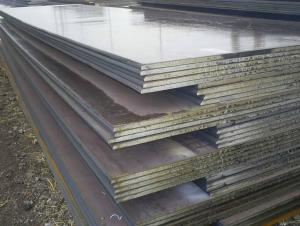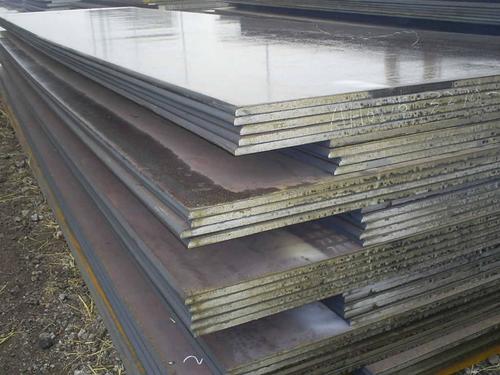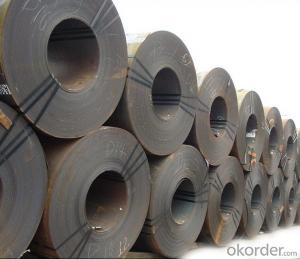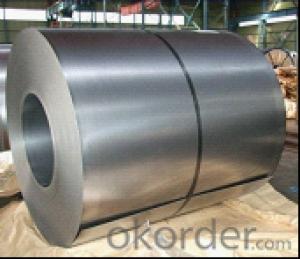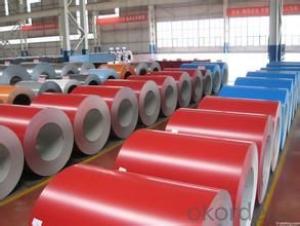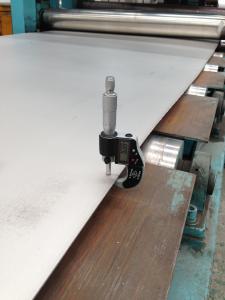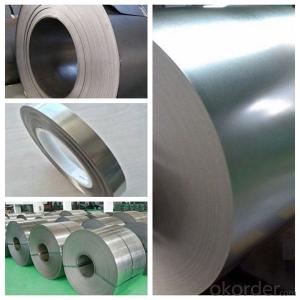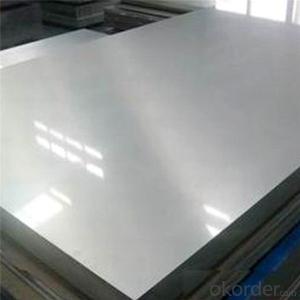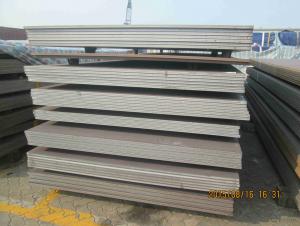High grade hot rolled plate
- Loading Port:
- China Main Port
- Payment Terms:
- TT OR LC
- Min Order Qty:
- -
- Supply Capability:
- -
OKorder Service Pledge
OKorder Financial Service
You Might Also Like
Plate refers to the thickness of the steel plate thickness 4.5-25.0mm, 25.0-100.0mm called the plate, thickness more than 100.0mm for heavy plate.
Plate mainly used in construction engineering, machinery manufacturing,container manufacturing, shipbuilding, bridge construction. Can also be used to make containers of all kinds, the furnace shell, furnace plate, bridge and vehicle static steel, low alloy steel plate, ship plate, boiler plate, pressure vessel steel plate, checkered steel plate, automobile frame steel plate, someparts and components such as welding tractor. Through plate uses: widelyused to make containers of all kinds, the furnace shell, furnace plate, bridgeand vehicle static steel, low alloy steel plate, plate for bridge plate, boiler plate,made like, pressure vessel steel plate, checkered steel plate, steel, automobile crossbeam tractors some parts and welding component specific application.
Bridge
For large railway bridge plate, requirements under dynamic load, shock,vibration, corrosion resistance, such as Q235q, Q345q etc..
Shipbuilding
Used in the manufacture of marine and inland river ship hull, require high strength, plasticity, toughness and cold bending performance, welding performance and corrosion resistance are good. Such as: A32, D32, A36, D36etc..
Boiler plate (boiler plate): used in the manufacture of various boilers andimportant accessories, because of boiler plate at medium temperature (350degrees below C) under the high pressure condition of work, in addition toendure high pressure, but also by the impact and fatigue load and water andcorrosion, requests to guarantee a certain strength, but also have welded andcold bending properties, such as good: Q245R
Pressure vessel
Mainly used for pressure vessel manufacturing petroleum, chemical gas separation and gas storage and transportation and other similar equipment,the general working pressure and pressure to 320kg/cm2 and even to 630kg/cm2, temperature of -20-450 degrees to work in the range of C, the requirements of vessel plate except with certain strength and good plasticityand toughness, must also have good cold bending and welding properties,such as: Q245R, Q345R, 14Cr1MoR, 15CrMoR etc..
- Q: Are steel sheets suitable for earthquake-prone regions?
- Yes, steel sheets are suitable for earthquake-prone regions. Steel is a strong and durable material that can withstand the forces generated during an earthquake. It has high tensile strength and flexibility, allowing it to absorb the seismic energy and deform without collapsing. Additionally, steel structures can be designed with proper reinforcements and connections to enhance their seismic performance. Therefore, steel sheets are a viable option for construction in earthquake-prone regions.
- Q: Can the steel sheets be easily joined with adhesive?
- Yes, steel sheets can be easily joined with adhesive. Adhesive bonding is a commonly used method for joining steel sheets together as it offers numerous advantages. Adhesives provide a strong and durable bond between the sheets, allowing for a seamless connection. They also distribute stress evenly across the joint, reducing the likelihood of failure. In addition, adhesive bonding does not require heat or specialized equipment, making it a cost-effective and efficient solution. However, it is important to select the appropriate adhesive for the specific type of steel and surface preparation is crucial to ensure proper adhesion. Overall, when done correctly, adhesive bonding can effectively join steel sheets together.
- Q: What is the electrical resistivity of steel sheets?
- The electrical resistivity of steel sheets typically ranges from 10^-6 to 10^-7 ohm-meters.
- Q: Are the steel sheets suitable for welding or fabrication purposes?
- Yes, steel sheets are suitable for welding or fabrication purposes. Steel is a versatile and commonly used material in various industries, including construction, automotive, and manufacturing. Steel sheets provide a strong and durable base for welding and fabrication processes. They can be easily cut, shaped, and joined together through welding techniques such as arc welding, MIG welding, or TIG welding. Steel sheets also offer excellent structural integrity and can withstand high temperatures and mechanical stress during welding or fabrication. Additionally, steel sheets are available in different thicknesses and grades, allowing for customization based on specific welding or fabrication requirements.
- Q: How do steel sheets compare to other sheet materials like aluminum or stainless steel?
- Steel sheets have several advantages over other sheet materials like aluminum or stainless steel. Firstly, steel sheets are known for their exceptional strength and durability. They can withstand heavy loads and are resistant to impact, making them ideal for applications that require high strength and stability. Aluminum sheets, on the other hand, are relatively softer and less resistant to impacts, making them more suitable for lightweight applications. Secondly, steel sheets offer excellent corrosion resistance. While stainless steel sheets also possess this characteristic, steel sheets can be coated with protective layers or galvanized to enhance their corrosion resistance even further. This makes steel sheets more suitable for outdoor applications or environments with high humidity or exposure to harsh chemicals. Aluminum sheets, on the contrary, are prone to corrosion and typically require additional coating or treatment for protection. Moreover, steel sheets are more cost-effective compared to aluminum or stainless steel sheets. Steel is widely available and has a lower production cost, making steel sheets a more affordable option for many industries. Aluminum sheets, on the other hand, tend to be more expensive due to the higher cost of the raw material and the manufacturing process involved. Stainless steel sheets are also relatively expensive due to the additional alloying elements present in their composition. Lastly, steel sheets offer excellent fire resistance. They have a high melting point and do not easily catch fire or contribute to the spread of flames. This makes steel sheets the preferred choice for applications that require fire safety, such as construction or transportation. In summary, steel sheets stand out due to their exceptional strength, durability, corrosion resistance, cost-effectiveness, and fire resistance. While aluminum and stainless steel sheets have their own unique properties and applications, steel sheets are often favored for their superior overall performance in various industries.
- Q: What is the purpose of steel sheets?
- The purpose of steel sheets is to provide a strong, durable, and versatile material that can be used in a wide range of applications such as construction, manufacturing, automotive, and engineering. Steel sheets are commonly used for building structures, making machinery and equipment, creating electrical appliances, and forming various products due to their high strength, resistance to corrosion, and ability to be shaped or fabricated into different forms.
- Q: How do steel sheets perform in corrosive environments like saltwater?
- Steel sheets exhibit excellent resistance to rust and corrosion in corrosive environments like saltwater. This is primarily due to the presence of chromium in the steel, which forms a protective layer of chromium oxide on the metal surface. This layer acts as a barrier, preventing direct contact between the steel and the corrosive elements in saltwater, thereby reducing the risk of corrosion. However, it is important to acknowledge that steel sheets are not completely immune to saltwater corrosion. Extended exposure to saltwater can still lead to some degree of corrosion, particularly when combined with other factors such as high temperatures, abrasion, or impurities in the water. To enhance the performance of steel sheets in saltwater environments, various protective coatings can be utilized. These coatings, including paint, galvanization, or epoxy, provide an extra layer of protection to the steel, further minimizing the chances of corrosion. Regular maintenance and inspection are vital to ensure the long-term effectiveness of steel sheets in saltwater environments. This involves cleaning the surface, eliminating any accumulated salt or debris, and rectifying any damaged or compromised areas of the protective coating. Overall, although steel sheets possess good resistance to corrosion in saltwater environments, it is imperative to take appropriate precautions such as using protective coatings and conducting regular maintenance to ensure their optimal performance and durability.
- Q: Are the steel sheets suitable for electrical applications?
- Yes, steel sheets are suitable for electrical applications. Steel is a good conductor of electricity, which makes it an ideal material for various electrical components and applications. It can be used for electrical enclosures, panels, cabinets, and other infrastructure where electrical equipment is housed. Steel sheets are also commonly used for grounding systems, electrical connectors, and electrical appliances. Additionally, steel sheets can provide durability and protection against environmental factors, such as corrosion or fire, which are important considerations in electrical applications.
- Q: Are steel sheets suitable for elevator shafts or cabin interiors?
- Steel sheets are suitable for both elevator shafts and cabin interiors. They are widely used in the construction industry because of their strength, durability, and versatility. Elevator shafts commonly utilize steel sheets due to their ability to withstand heavy loads and provide structural support. Additionally, they offer excellent fire resistance and can endure extreme temperatures, ensuring a safe environment. Regarding cabin interiors, steel sheets provide numerous advantages. They can be easily shaped and sized to allow for customization and design flexibility. Moreover, steel sheets can be painted or coated, resulting in a smooth and visually appealing finish. They are highly resistant to wear and tear, guaranteeing long-lasting durability in high-traffic areas such as elevator cabins. Furthermore, steel sheets possess soundproofing properties, which are essential for creating a comfortable and quiet experience for passengers in elevator cabins. Additionally, they resist moisture and corrosion, making them suitable for elevator cabins located in humid or coastal regions. In conclusion, steel sheets are an exceptional choice for elevator shafts and cabin interiors due to their strength, durability, versatility, fire resistance, soundproofing capabilities, and resistance to moisture and corrosion.
- Q: What are hot and cold plates?
- Cold rolled coil is made of hot rolled coil as raw material and rolled under the recrystallization temperature at room temperature, including plate and coil. Many steel mills in China, such as Baosteel, WISCO, Anshan Iron and steel company, can be produced. Among them, the delivery is called steel plate, also known as "box plate" or "flat"; the length is very long, the volume of delivery, known as "steel band", also known as "coil.".
Send your message to us
High grade hot rolled plate
- Loading Port:
- China Main Port
- Payment Terms:
- TT OR LC
- Min Order Qty:
- -
- Supply Capability:
- -
OKorder Service Pledge
OKorder Financial Service
Similar products
Hot products
Hot Searches
Related keywords
